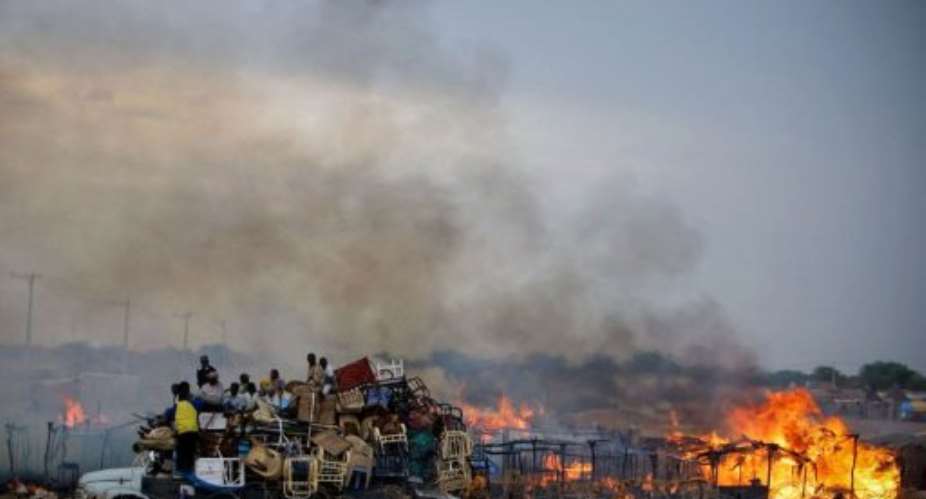PARIANG, Sudan (AFP) - Families recall fleeing for their lives when the remote town of Jau, on the border of north and south Sudan, was targeted by army bombings that destroyed the market and scattered the terrified population.
The army air strikes began just days after heavy fighting erupted across the border in South Kordofan, on June 5, between the Sudanese Armed Forces (northern army -- SAF) and militia aligned to the soon-to-be-independent south.
"Antonovs bombed the area and killed my son" says Thrab Deng Nading, a woman from Jau. So she hurriedly left on foot with her remaining four children and came to Pariang, the county capital, a day's walk across the vast plain.
The International Organisation for Migration (IOM) says that 3,700 people have fled Jau since the attacks, with many ending up in Pariang and the nearby towns of Faring and Aliab.
Witnesses say Jau's market was completely destroyed in the second bombing raid, and the remaining population fled as the deadly attacks continued.
Many southern-aligned fighters from South Kordofan had regrouped at the lakeside town, on the south side of the border in Unity state, which has now become a possible new frontline between the south's, Sudan People's Liberation Army (SPLA), and the SAF, its former civil war enemy.
"We can sometimes hear the sound of the bombing," says John Miakol, the Pariang secretary for the South Sudan Relief and Rehabilitation Commission (SSRRC), a government organisation charged with helping the displaced.
Army planes have also been seen flying over Panyang, 15 kilometres (10 miles) north of Pariang.
"I am worried that Antonovs will follow us here and bomb Pariang town," says Ayak, another woman who fled Jau 10 days ago.
Leaving their homes and belongings behind, families such as hers are left with little to survive on, and rely on the generosity of the already-stretched local population.
The closure of the roads between north and south Sudan has led to skyrocketing food prices and severe shortages of basic supplies in recent weeks.
The price of sorghum, a local staple, has doubled in the state capital Bentiu, according to the World Food Programme, and fuel prices have shot up too, ironically in an area criss-crossed by pipelines from the state's oil fields.
The supply disruptions and influx of people have come in the middle of the so-called "hunger period," when families cut back on household consumption because last year's produce has been depleted and this year's first crop has yet to be harvested.
The rainy season is also in full swing, so that many of the fugitives, as well as having to beg from local families to feed their own, have no shelter.
In a lone building on the outskirts of town, around 40 families have taken refuge from the torrential rains that render many of the roads to Pariang impassable.
The county commissioner, Mabek Lang Mading, fears the lack of adequate shelter could cause disease, saying that hygiene and sanitation are not being maintained.
"The IDPs (internally displaced persons) are in urgent need of assistance," Mading says.
Compounding their woes, there appears to be no resolution to the conflict across the border, which has already forced more than 70,000 people to flee, according to UN estimates.
"I don't see any progress by the warring sides in South Kordofan," Mading adds.
Whether or not the bombing continues after July 9, when south Sudan will formally declare its independence from the north, is becoming an ever more pressing issue.
Until now, the SPLA has shown restraint in not responding to the attacks, with southern officials insisting that nothing will jeopardise their hard-fought and long-awaited independence. But this may change.
"If they are still bombing Jau after July 9, then we will definitely respond," Mading warns.
Some families in Pariang hope to return home once the bombing has stopped.
"When there is no more fighting, I can go back to Jau to see if my husband is still alive" says Ayak.
But others who have already lost family to the violence expect to start a new life from scratch.
"My son who was killed was the only one supporting me," says Thrab. "I will not go back, no way."
© 2011 AFP





 Meta releases new version of conversational AI across its platforms
Meta releases new version of conversational AI across its platforms
 Cape Town named Africa’s Best Airport 2024 by Skytrax
Cape Town named Africa’s Best Airport 2024 by Skytrax
 Bono East: Four injured after hearse transporting corpse crashes into a truck
Bono East: Four injured after hearse transporting corpse crashes into a truck
 ‘Be courageous, find your voice to defend our democracy’ — Sam Jonah urges journ...
‘Be courageous, find your voice to defend our democracy’ — Sam Jonah urges journ...
 Exodus of doctors, nurses and teachers have worsened because of unserious Akufo-...
Exodus of doctors, nurses and teachers have worsened because of unserious Akufo-...
 2024 election: Avoid insults, cutting down people in search of power – National ...
2024 election: Avoid insults, cutting down people in search of power – National ...
 ‘You passed through the back door but congratulations’ — Atubiga on Prof Jane Na...
‘You passed through the back door but congratulations’ — Atubiga on Prof Jane Na...
 Government’s $21.1 billion added to the stock of public debt has been spent judi...
Government’s $21.1 billion added to the stock of public debt has been spent judi...
 Akufo-Addo will soon relocate Mahama’s Ridge Hospital to Kumasi for recommission...
Akufo-Addo will soon relocate Mahama’s Ridge Hospital to Kumasi for recommission...
 We must not compromise on our defence of national interest; this is the time to ...
We must not compromise on our defence of national interest; this is the time to ...
